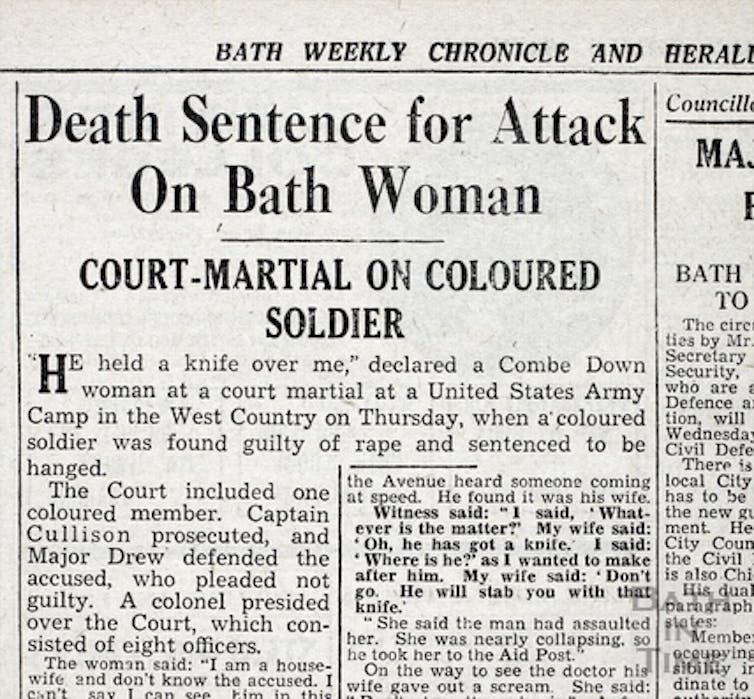Eighty years ago this summer, 150,000 American servicemen were in the UK to support the allied campaign against Nazi occupied Europe. The British government hoped their presence would strengthen the “special relationship”. But controversy over the administration of justice soon challenged that assumption.
Tension first emerged when an English court convicted two American soldiers of armed robbery. Each was sentenced to hard labour and one faced additional punishment by whipping (the Whipping Act of 1530 permitted whipping or flogging for a wide range of offences and until 1948 courts retained power to order whippings in cases involving violent crimes).
The US ambassador, John Gilbert Winant was furious. Britain’s home secretary, Herbert Morrison, prevented the flogging, but it was not enough. Winant demanded American jurisdiction over US soldiers.
English law made soldiers subject to civilian courts for breaches of criminal law. In the USA, exclusive jurisdiction over serving soldiers was entrusted to military courts.
At first, the British were obdurate. Exemption from British law for US soldiers serving in the UK would undermine British sovereignty. But pressure from Washington was intense, and Britain buckled. In July 1942, Anthony Eden, the foreign secretary conceded the United States of America (Visiting Forces) Act.
The Times, Daily Telegraph and Manchester Guardian reported (on a paywalled archive) that there was widespread opposition to this surrender of British judicial sovereignty. Clement Davies, the Liberal MP for Montgomery, called it a hasty fait accompli. Major Abraham Lyons, Conservative MP for Leicester East, said he had heard nothing to justify the legislation or the “haste with which it had been introduced”.
British concern about US military justice reached a crescendo when it produced verdicts prejudicial to black servicemen. By October 1942, American officers were worried about a “growing number of racial incidents in which British civilians were taking the side of the black GIs”.
Read more:
Black troops were welcome in Britain, but Jim Crow wasn’t: the race riot of one night in June 1943
Home Intelligence reports found that Britons were “characteristically against discrimination”. The prosecution for rape of a 30-year-old black GI, Corporal Leroy Henry of St Louis Missouri, would bring Anglo-American tension to boiling point.
Irene Lilley of Combe Down near Bath told police that Henry raped her shortly after midnight on May 5 1944. She said Henry knocked on her window, told her he was lost and asked for help to find the way back to his base. Lilley agreed to help and showed the GI to the railway station.
When she did not return, her husband set out to find her. Lilley found his wife in a ditch beside the road. She said Henry had raped her. British police arrested Henry immediately and handed him over to the US military.

Henry faced trial by a court martial jury with only one black officer. His signed confession admitting rape at knife-point was placed before the court. He was convicted and sentenced to be hanged.
Insecure conviction
Evidence that the conviction was insecure emerged in the Daily Mirror. The popular left-wing title revealed that Henry had confessed after being deprived of food for 24 hours. US military police “admitted they had made him stand to attention for forty-five minutes during questioning”.
British historian David Reynolds recounts in his 1994 book, Rich Relations: The American Occupation of Britain, 1942–1945 that it was eventually claimed that Henry had knocked on Lilley’s window before and paid her £1 for sex. On May 5, she had asked for £2. He refused and she allegedly threatened to cause him trouble. Henry’s comrades testified that he did not own a knife and they had never seen him carrying one.
The sentence provoked an angry reaction from the British public. The Daily Mirror received many letters from readers opposed to the death sentence. The Daily Mirror insisted that there were aspects of the evidence that “would have inspired a reasonable doubt in the minds of a British jury”.
Popular sentiment would be “much appeased if justice could be tempered with mercy”. Such a decision might not be possible in America “which has a colour problem peculiar to herself”. In Britain, it was possible to “take a different view”.
Within days, General Dwight D Eisenhower, the commander of US Forces in Europe received a petition for clemency signed by the mayor of Bath and more than 30,000 local residents. From the USA, Thurgood Marshall of the National Association for the Advancement of Coloured People (NAACP) asked for a stay of execution.
The left-wing weekly Tribune published Henry’s claim that he had been forced to confess. In America Time summarised the Mirror’s account.
Now, Eisenhower’s legal team moved fast. Captain Frederick J. Bertolet, the assistant judge advocate for the European Theatre of Operation (ETO) concluded that Henry’s confession had been forced. He was “an ignorant soldier” who had not understood what he was signing. Lilley’s conduct “cast doubt on her credibility”. There was insufficient evidence to support the conviction or to warrant retrial.
Henry was free to return to duty. The British press had done good work, but the Americans resented it profoundly. They demanded press censorship in rape cases.
The British refused, but the Americans found a solution. From November 1944, the crime statistics they shared with British officials ceased to distinguish between white and black soldiers. Colonel Jock Lawrence, the public relations officer for the ETO, was determined that the British press must be denied further opportunity to depict the USA as “some uncivilised nation”.
![]()
Tim Luckhurst has received research funding from News UK and Ireland Ltd. He is a member of the Society of Editors and the Free Speech Union. His forthcoming book, Reporting the Second World War: Newspapers and the public in wartime Britain will be published by Bloomsbury Academic in February 2023











